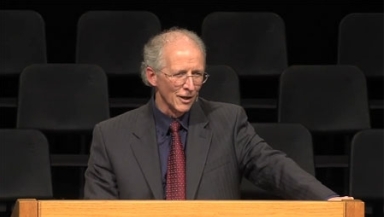
It was a moment of clarity from my 9-year-old adopted daughter: "I think I'd like to be a police officer when I grow up". My heart swelled. Her biological family was sadly accustomed to being on the other side of the law. But it suddenly seemed perfect for her – she is gregarious, fearless, courageous, and resourceful. Her daily experience of caring for younger foster siblings while joining in the banter of the older teenage siblings brings out the best in her – a combination of a strong sense of justice alongside incredible compassion. When she told me her ambition I couldn't have been prouder. I can imagine her being a great police woman; upholding the law, protecting the vulnerable, rescuing the desperate. What a brilliant profession for a follower of Jesus.
So I must admit I was upset by John Piper's comments to Beth – a single Christian lady who shared an ambition with my 9-year-old, writing:
"For a couple of years now, I have felt drawn to police work as a vocation. I am unmarried and, should I become married and my husband object, I would discontinue work as a police officer. At this point my question is a question of principle: Can a single Christian woman, who is a complementarian, become a police officer?"
Dr Piper is a well known figure in the conservative evangelical world. He spearheaded the "Biblical Manhood and Womanhood" movement, co-editing a book of the same name with Wayne Grudem. The book argues against women taking up leadership positions in the church and home. Piper has long been outspoken on his views on gender but this week things took a new level as he answered Beth's question. He started graciously, stating: "I love Beth's spirit and I hope I can be of help without telling her what she should do." But then went on to say:
"If a woman's job involves a good deal of directives toward men, they will need to be non-personal in general, or men and women won't flourish in the long run in that relationship without compromising profound biblical and psychological issues. And conversely, if a woman's relationship to a man is very personal, then the way she offers guidance and influence will need to be more non-directive. And my own view is that there are some roles in society that will strain godly manhood and womanhood to the breaking point."
I have quoted Piper at length as I don't want to distort his view; in fact you can read the whole statement here.
My understanding of what he is trying to say is that Beth should give up her dream of working as a police officer. By implication, I assume he would similarly advise my daughter to give up her dream, so I feel the need to delve deeper and ask some awkward questions.
1. Are we submitting to Scripture or hijacking it?
When we are convinced that we are right, the temptation is always to conscript the Bible to suit our own views rather than letting Scripture set the agenda. So for example, some egalitarians claim that the apostle Paul is sexist and so his letters can be ignored. This is not a suitable position for Christians who believe the scriptures are the word of God; we don't get to edit Scripture to suit our own desires. But it seems to me that Piper is committing the same mistake in handling the Bible, pushing it beyond what it is claiming.
Piper has concluded that according to his reading of the Bible men are to lead in the home and the church and therefore they should also lead in the workplace. This in itself is a very big leap not supported by all complementarians because of a lack of biblical evidence. Piper has also come up with a novel way of thinking about leadership – differentiating between the personal and impersonal. He argues:
"A woman who is a civil engineer may design a traffic pattern in a city so that she is deciding which streets are one-way and, therefore, she is influencing, indeed controlling, in one sense, all the male drivers all day long. But this influence is so non-personal that it seems to me the feminine masculine dynamic is utterly negligible in this kind of relationship...
"On the other hand, some influence is very directive and some is non-directive. For example, a drill sergeant might epitomize directive influence over the privates in the platoon. And it would be hard for me to see how a woman could be a drill sergeant — hut two, right face, left face, keep your mouth shut, private — over men without violating their sense of manhood and her sense of womanhood."
The delineating factor basically seems to be that women can have influence over men if the men can't see the women leading them. This involves a number of huge assumptions that the Bible does not speak directly into and ignores some important biblical examples. Stephen Holmes, senior lecturer in Theology at St Andrews University, commented to me: "How about Rebekah's instructions to Isaac in Genesis 27? When Josiah discovers the Book of the Law and sends for guidance from the prophet Huldah, her response – 'Tell the man who sent you to me, This is what the Lord says...' – sounds at least moderately directive!"
Complementarian theologian Carl Trueman has raised serious concerns with Piper along similar lines, arguing that he has gone beyond the scriptures:
"I rarely read complementarian literature these days. I felt it lost its way when it became an all-embracing view of the world and not simply a matter for church and household. I am a firm believer in a male-only ordained ministry in the church but I find increasingly bizarre the broader cultural crusade which complementarianism has become. It seems now to be more a kind of reaction against feminism than a balanced exposition of the Bible's teaching on the relationships of men and women...Too often cultural complementarianism ironically offers a rather disenchanted and mundane account of the mystery and beauty of male-female relations. And too often it slides into sheer silliness."
2. Are we acting like Pharisees?
The Pharisees were rebuked by Jesus for using one part of Scripture to trump the others. For example, they seemed to be good at tithing but not so good at practicing generosity:
"Woe to you Pharisees, because you give God a tenth of your mint, rue and all other kinds of garden herbs, but you neglect justice and the love of God. You should have practised the latter without leaving the former undone," (Luke 11:42).
The problem seemed to be that the Pharisees liked some parts of the Bible more than others, and so selected the verses that suited themselves better. When it comes to the discussion of vocation, Piper appears to have made gender roles the trump card. Gender seems to override someone's character, experience, education or calling. This is like 'straining out the gnat but drinking the camel' – focusing on a narrow reading of certain texts as a single issue lens on this issue. Specifically making career decisions based on gender alone seems to me a disastrous piece of pastoral advice. Surely someone's character, calling and commitment and the current needs of the world should be determining factors in deciding how to serve God today?
3. Are we making the gospel less attractive?
Evangelical theologian J.I. Packer has said, "I think it is an open question whether in our day Paul would have forbidden a woman to teach from the Bible." In other words, Packer recognises that we are in a different context to Paul's first audience when he wrote 1 Timothy. Packer is a careful exegete and is not one to quickly ditch biblical teaching, but even he recognises that there are contextual factors that influence the application of a biblical text. Derek and Dianne Tidball go further: "Today, Paul is likely to argue that the refusal to permit women to exercise leadership in the church is what brings the gospel into disrepute." This is a fascinating perspective. Sadly I have spoken to many young women who feel so hurt by sexism in the Church that they have walked away from faith. Some expressed to me that they felt their identity as women created in the image of God, co-equal in status with men, was not honoured. Surely no one on either side of this debate would want this to be a stumbling block to people coming to faith?
In Titus 2 when Paul explains what needs to be taught to various groups of men, women and slaves, three times he reiterates that his concern is the reputation of the Church of God. Paul argues that we should do whatever we can "so that in every way...[we] will make the teaching about God our Saviour attractive" (Titus 2:10). If biblical theologians are asking questions about how lack of equity in the church can be a stumbling block to people coming to faith, then shouldn't we also raise questions about Piper's tenuous and restrictive position on the roles of women in wider society?
4. What does this mean in practice?
Additionally, I struggle to understand how Piper's injunctions are to be carried out in practice. Are we really restricting women to either get married and stay in the home or to only take entry-level jobs? What about if you are a male academic and you have a female Chancellor? Should you leave? Should a woman turn down all promotions as they will inevitably mean taking managerial responsibility over men? What should a male politician do if a woman prime minister or party leader is elected? Should all men who have female bosses resign? Should all female bosses managing men resign? Should a single mother cease to lead her family if she has teenage boys? I am not alone in raising these kinds of questions; Aimee Byrd, a complementarian female blogger, wrote:
"I am having a hard time understanding these guidelines. My influence in the civil sphere has to be non-personal and non-directive? Or I will upset the feminine masculine dynamic? Should we then get rid of women doctors and nurses? I don't see how one could do that job without being both personal and directive. I'm sure they have many male patients whom they have to tell what to do. And we wouldn't want women in any administrative roles then either. There would be so many jobs that "mature" women would not be able to serve in were they to follow these principles. I respectfully disagree with John Piper's principles for women. This just isn't biblical."
5. Mission or maintenance?

As I read about Jesus' ministry, he offers women so many opportunities to take the lead despite the norms of his culture. Jesus accepts financial support from women (Luke 8:3) and encourages them to be evangelists (John 4). He uses women as positive role models for generosity (Luke 21:1-4) and promises the global retelling of a woman's sacrificial service (Matthew 26:13). Jesus also enabled women to be the first witnesses of the resurrection, and they led the disciples to see for themselves (Luke 24:1-12).
Jesus does not seem to have a problem in using women in roles that give them personal directive influence over men. If we are going to help see the Kingdom of God demonstrated in our time, we need to see the skills, gifts, wisdom and experience of every member of the body of Christ utilised. Just as the Spirit of God is poured out on all flesh, so we should celebrate the leading of the Spirit present in every believer. Paul is clear that the interpersonal relationships of members of the Church should be a means to make the gospel more attractive to our culture. By extrapolating sub-biblical gender-based stereotypes, we will surely do the opposite.
There are many things to love about John Piper: his commitment to global mission, his concern for the alleviation of poverty, his vision of delighting in God's glory as the central purpose of human existence and his enthusiasm for biblically faithful preaching. But despite all of these wonderful traits, I hope he doesn't get the opportunity to offer my daughter career advice any time soon.



















